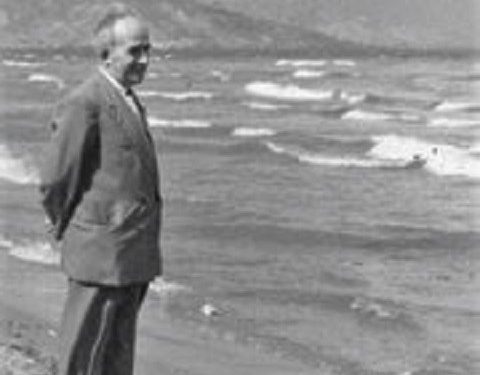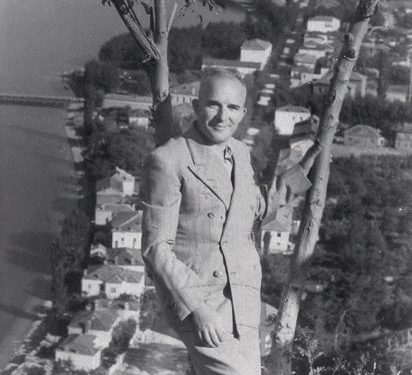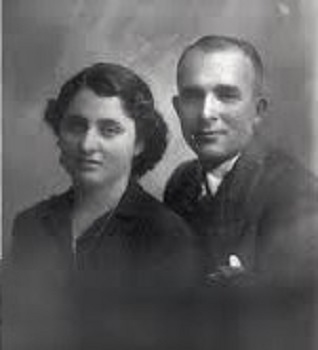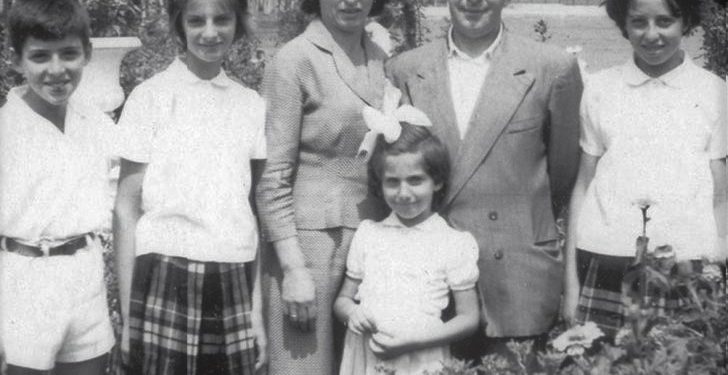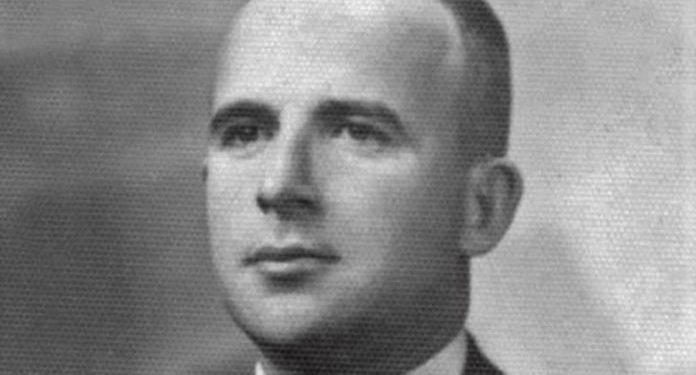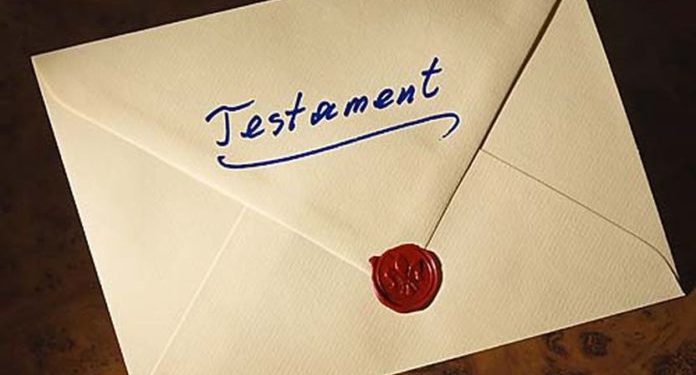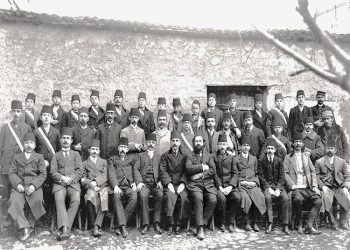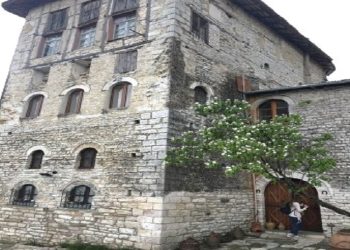By Mitrush Kuteli (Dhimitre Pasko)
Memorie.al / Dhimitër Pasko or as he is known by his literary name, ‘Mitrush Kuteli’, was born in Pogradec in 1907. He completed his higher studies in Bucharest, Romania, where in 1934, he graduated in Economic Sciences. Among the important writers of Albanian literature, Mitrush Kuteli has also been described as the founder of the modern story. In fact, his intellectual activity is of a wider spectrum than only in the field of literature. He is present in the press of the 30s, with a series of critical articles, publisher for a period of time as well as a specialist in financial matters. Also, his interests extend to the field of ancient history research. Mitrush Kuteli was a polyvalent character. After the war, after working for a short time in the Ministry of Finance, he was appointed director of the National Bank of Albania, where he remained until the end of 1946. During the extensive campaign of purges and arrests of the Albanian intellectual elite by the communist regime of Enver Hoxha newly come to power, was arrested and sentenced, spending two years in political prisons. He was amnestied after the conviction of Koçi Xoxes and worked as a translator at the “Naim Frashëri” Publishing House in Tirana, while the right to publish was no longer given to him. The production of this intellectual was restrained by the communist regime and his creativity was almost left in the wild.
PART OF A REQUEST…!
It has been years since I started and I have pushed quite far some literary works, which in my current state I cannot finish. The most important are the novels “IN A CORNER OF LOWER ILLY” (from the distant Illyrian past) and “EXILE AND RETURN” (the end of the last century and the beginning of our century). Then: a series of short and long stories from the pre-liberation and post-liberation periods.
The division of working time between standardized translations and original writings in my health conditions causes me to frequently break the thread of thought, fragmenting those few good hours in different sectors, in different preoccupations. Once upon a time, when I was young, when I was healthy, I easily switched from one type of work to another: during the day I dealt with economic issues, and in the evenings I dealt with literature.
Now I am no longer good at doing such a thing. It is the age when a person thinks more than he acts. Often, to knead a small literary fragment, especially in the parts with strong carvings, I need whole days of thinking, reworking, I have to discard the many variants that flash in my mind and trouble me a lot, to choose and keep what looks best. I often have to do this work after bouts of breathlessness in the midst of spondylitis pains caused by dislocated vertebrae, after sleepless nights.
I fight diseases with drugs, but these make me dizzy more than they heal. As soon as I recover, I set to work with great thirst to catch up with the lagging norm and to further the literary works begun. However, in old age, a person becomes more demanding of himself, more dissatisfied with him as far as the interior and the owner are concerned.
The fragment I had written yesterday – and which I liked then – the next day seems weak, so it must be changed, reworked, simplified. Alas, in art, the road to the simple often leads through the complicated, which the artist must discard as the farmer discards the chaff and stores the grain. And this requires a lot of work, patience, silent self-criticism, dialectic with oneself, so that the best replaces the good.
In such circumstances I work today.
Therefore, please help me again so that in the future I can devote all my good hours to literary creativity. This can be done by permanently removing the translation rate or, at least, for a limited time, for example three years.
I advise, redeemed by the work of translations to which I have dedicated almost 16 years of my life, I will be able to finish the literary writings I have started and I will be able to go deeper into journalism to reflect the facts of our days.
When I dare to submit such a request, I also bear in mind the fact that today in our country there are enough translators who can very easily take the place in the field of translations, so that my absence will not be felt at all. At this time I will devote myself to the original writings, I will try to make them speak the ancient Illyrian tombs, the stones of our old castles, which show the strong endurance of a strong people, and this endurance of becomes an example for the younger generations.
I will try to honor my word and come clean.
With respect
Dhimitër Pasko (M. Kuteli)
Tirana, June 17, 1965
(Street “4 Martyrs” No. 73).
WILL ADDRESSED TO WIFE
Dear Efterpi,
I wanted to write this letter, which is probably the last, by hand, but I can’t. Today my hand is not safe, my hand is shaking. You are not here. You went with Pandi to Rrushkull to see Polixenes and Atalanta. I encouraged you more. From worry, from longing. I am home alone. Doruntina has gone wild with the Bajram girls.
My mind is clouded by insomnia, by bad dreams. As if the Germans were following me, to hang me. I ran away, entered the pits and wells, and came out again. They followed me. I was being caught. I ran away again. In an instant, you were also by my side. And we ran away. Then we parted. In the end I found myself followed by our people… again pits, wells, precipices. As if I was in Berat, under the Castle.
In a sterre of the Castle, near the Church. Further to Fier. I had escaped from persecution and was looking for a house to hide. I was barefoot, naked. Someone called me: “Stay, Dhimitri! Let’s take it.” They surrounded me, took me and were trying to kill me. I laugh. I enjoyed being killed…! And so, I found myself in prison. Many people. Among them Sofo Çomorra, who has died. He looked at me with pain.
“How did it happen, O Pasko! What have you done”? “I don’t know”, “Look here”. And he gave me some beautifully written papers: an indictment and some other links. They called me a gambler. They told me that I had made a poem about the glyra with Italian rhymes. I saw Andrea. I’m sorry. They decided to kill me. I was happy again. “The end will die, I said. I will save. I will relax. My life has been very turbulent, confusing, good and bad. How well it ended.”
When I got up, you were getting ready for Rrushkull. My head was and still is heavy. You went at half past seven. After 5 minutes, Sterjo’s father Ilua brought me the news: Thanas Cikuli died…! In my mind, saved. I envy him. Death is great rest, separation from pain. True, even from newspapers, but at a time when a person is very sick, upset, death is salvation: from physical and spiritual pain.
Both are heavy. You know how many such pains I have had recently. One, that you know, is that as a result of them I am not good at working, creating, paying the bread that the state gives me for myself and my children. I have never been and never want to be a parasite. What should I do, woman? I can’t. My head is cloudy…!
I started the letter for another thing: to repeat my last orders. I’m sorry to bother you. I have told you so many times. I have poisoned your life, because others have poisoned me too. And I have not been good at keeping the poison to myself, as I should. May this be the last poison I bring you?
We came together; we always became children in stormy years: prison, urbanism, and hotel. But then I was healthy and overcame everything. Now, you know…! I know my days and nights. Diseases and worries ate me up. I now see death as a release from pain. I don’t want it, but I can’t get rid of it. I see it coming, it’s coming. I am sorry that I will leave the little children, without an arm, maybe in great poverty, unable to achieve their goals. My pension will not be enough.
I have no “years of service”. Of course, 22 years out. Even there I worked until I died, but these years of work do not count for the pension effect. My bad luck, their bad luck. Perhaps, after death, when passions and hatreds cease, our country can help you for the sake of my past work: in journalism and literature, from a tender age, and especially in the economic field. A part of my writings – Albanian and Romanian – is there, in the National Library.
Some people know my efforts against Italian capital, against German robberies. I worked without personal interest. I have never pursued my own enrichment, because this enrichment could only be made by two means: by theft (there are a thousand and one ways of theft, and I have used none of them) and by treachery, serving foreigners to rob the country and received for this service. I chose the opposite path: the fight against those who wanted to rob, those who robbed.
I couldn’t stop them all, not because I didn’t want to, not because I was interested, but because I couldn’t. That much I could, that much I did. Against Italian robberies, against German robberies, against Yugoslav robberies. I never chose the path of self-comfort, the path of “the wise, the gentle and the spoonful”. I worked hard, I loved a lot, I made a lot of mistakes. Now life is gone and it cannot be returned, it cannot be repaired. I told you that the Germans will hang me in front of the town hall, when they find out that I sabotaged the release of the new currency that they wanted to do. I was saved by luck.
I will never blush with shame even with my action in the early days of liberation. I worked like crazy, fought against Yugoslav robberies. Even more strongly I cannot blush with shame even with my practical activity – the economic field – in Romania. Even there against the Germans. As the son of a small nation, I have always had a great hatred against the black idea of ”peoples over peoples”, or “big people over small people”, but “peoples alongside peoples”.
This principle has fed consciously and unconsciously, automatically, my activity. I was against the Russians because they subjugate and denationalize other peoples; against the Germans because they exploited and exterminated other peoples; against the English for the same reason. The son of a small people could not do otherwise. In Romania I fought, as much as a small man can fight, against the exploitation of domestic and foreign capital.
I had this attitude even when I was a bank director. One of the first consequences was a “black tab” in the German apparatus of Vienna, in 1940-’41. Someone at the bank told me about this “black tab”: “What are you doing like this? Don’t know what to expect? Why do you object to the place of Jewish capital being taken by friendly German capital”?
I know one thing: capital can never be a friend, only capital. Ay feeds on profits, sustains on profits, lives on profits. And the profits never end. One wants to become two, both four, four eight, a thousand ten thousand, a million a hundred million and so on. To the detriment of people, peoples. As a former director of three banks (always poor), I know that old profit is not saturated with new profit, like the sea is not saturated with water.
Will someone recognize and understand me, at least after death? I do not know. I wanted him to understand and know me, not for honor and glory, but so that my children – to whom I leave my work and my dreams – do not suffer for bread when they are small, follow their studies and find their way in life.
I am sure that if my work and efforts in the past were appreciated in this direction, the children would not suffer.
I set out to write a short farewell letter, and I got fired up – although my ears are ringing and the back of my head hurts – and look where I got to.
Listen!
I don’t have good signs. The tension rises and falls, the heart stops. I leave for the office or for a walk and my legs are cut, my breath is held. I stop and poison myself with medicine. My nights are hellish, as I know. All this says that I don’t have it long. So don’t be sad that I am ordering you again.
- When I die, don’t make announcements from the ones that climb the walls. Death is an event that belongs to the dying person and his household. Why should the world know? I do not want!
- You will not announce before the funeral, anyone, except for five or six closest people to do the funeral formalities and burial. That’s it. I don’t like to upset anyone. Everyone has their own problems.
- I once wanted to be buried in Poradec, next to my father and mother or up in the chestnut trees, in Shën e Djëlë. Now I have changed my mind. Burial is a mess. Bury him here, in Tirana. All of Albania is! I don’t want any inscription on the grave. Just a cross, like father, grandfather, great-grandfather.
- I command the children to love our country and language to the point of suffering. Do not open your heart against Albania even when they will suffer without fault. Homeland is home, even when it kills you. They were born here; they live here with flesh and soul, even with pain.
Atalanta and Pandeliu have a penchant for literature. Let them finish their studies in some practical branch – physics, medicine or any other faculty, the word comes, for teachers, and let them also deal with literature. But not as a main profession. Professionalism in literature, in our country, is always a path of suffering, its bread is bitter. Bitter, I say, for one who does not know tricks and hypocrisy.
The field of literature is a land where snakes roam. They kill your friends, because you are a shadow. And when you don’t shade them, it means that you are not good at literature. I leave the manuscripts to both of them, especially Pandeli. Let no one touch them! Ay will grow, read the unrealized notes, and process them. For this he must first accumulate a lot of culture. Talent, inclination is worth nothing without work, without culture.
Let no one touch the manuscripts before my son grows up! You put them in the cash register, close them!
Polixenes and Atalanta! Pandeli and Doruntina!
Love each other, help each other, and bear with each other! Don’t notice trifles; don’t fight over trifles, over anything. Throw away anger, because it is the source of many evils. Try not to get carried away. Anger and arrogance have done us great harm.
They destroy us; let your heart not know hatred, strife, and grudge. Wisdom, gentleness, generosity! Open your eyes to every step you take in life. Life can be ruined by one wrong step, just one step.
Then come the precipice. When the time comes, get married. To listen to the voice of the heart, but also of reason. Often the heart leads you on the wrong path, if reason does not compel it. Do not ask too much of life, because life is stingy in goodness. Do not dream what cannot be realized. Do not be measured by the morning shadow, by arrogance. You will ask life as much as it can give you.
Love and honor your mother, because she was brave in life, she suffered a lot. We both missed. Make old age a little sweeter after so many storms. She has accumulated a lot of experience from bitter life, and this experience can be useful for you, so that you do not suffer.
Doruntina is the smallest. She needs many years of help and guidance. Don’t spare your help, so that I can rest peacefully on the ground.
Don’t make me cry! Hold on! I saved my life, I finished my life. I don’t want others to see you cry. Listen to me? Tears are useless. Who dies does not rise again. I don’t even want to be resurrected; I don’t even want to start life again. Enough! Do not violate this order.
Efterpi, sorry for this latest upset! Hold and encourage the children. Do as I ordered. Don’t change anything. I don’t want people at my funeral. Most come for beauty, for form. I’ve always hated pompous, tumultuous funerals. A few more words: it is understood that you will not even inform your people, here or in Korça, with the exception of Foq and Nesti.
You will warn your uncle, the elder (K.) and his wife, not to step in our house. Neither you nor my children need their visit and comfort! Never! I have always told you: blood does not become water… it becomes pus.
And for this reason, I don’t want my sister, Lirie, to cry and make her gurgle. Today she kills me with her dirty mannerisms, tomorrow she makes me cry, like in a comedy. Out!
I hug you, please forgive me and goodbye. Memorie.al
Yours,
Dhimtraq




